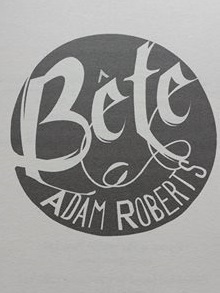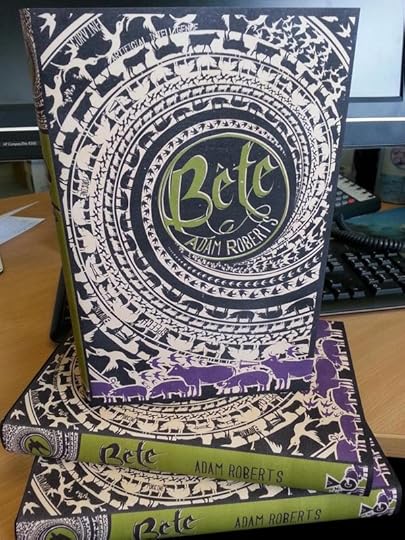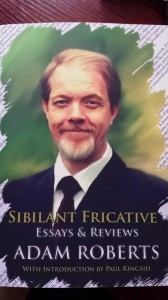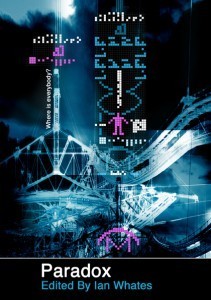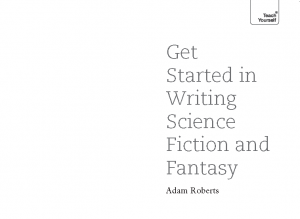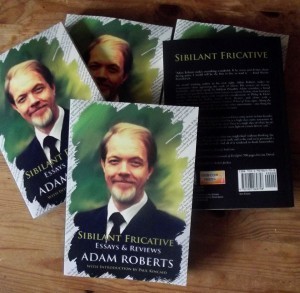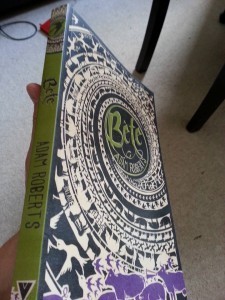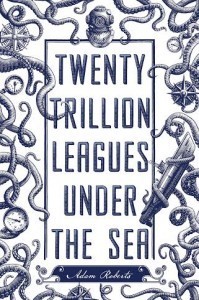Adam Roberts's Blog, page 14
September 18, 2014
Starburst review Bête
... and it's a doozy. The last three paragraphs:
"Graham, as narrator, is a character we can all identify with, a man who knows his flaws and accepts them as part of who he is. It’s a pleasure to read about him and, thanks to the skills of the author, we’re immersed in his journey rather than simply being told about it. There are moments of laugh-out-loud hilarity, yet when Graham feels pain, we feel it too; when he hurts, we hurt along with him, to the point of sharing his sadness. Be warned – there may be tears.
As the novel progresses, society inevitably alters and adapts to the new animal intelligences and, while it’s all very believable, it’s not necessarily in the way the reader would expect. Ultimately, because Bête is about this one man, it’s all seen through his eyes; it feels post-apocalyptic at times until being reminded that society, however different, still exists.
The greatest science fiction novels take into account the changes on the people affected by the advances in technology, and Bête ranks with the best of them. What could have been just quirky and satirical – it is both – becomes so much more through intelligent writing that takes the reader through a whole range of emotions. Bête is a wonderful book that, once begun, insists on being read in one sitting; darkly comic, it’s a deeply thoughtful, moving and uplifting story from a master of the genre."
Starbust review Bête
... and it's a doozy. The last three paragraphs:
"Graham, as narrator, is a character we can all identify with, a man who knows his flaws and accepts them as part of who he is. It’s a pleasure to read about him and, thanks to the skills of the author, we’re immersed in his journey rather than simply being told about it. There are moments of laugh-out-loud hilarity, yet when Graham feels pain, we feel it too; when he hurts, we hurt along with him, to the point of sharing his sadness. Be warned – there may be tears.
As the novel progresses, society inevitably alters and adapts to the new animal intelligences and, while it’s all very believable, it’s not necessarily in the way the reader would expect. Ultimately, because Bête is about this one man, it’s all seen through his eyes; it feels post-apocalyptic at times until being reminded that society, however different, still exists.
The greatest science fiction novels take into account the changes on the people affected by the advances in technology, and Bête ranks with the best of them. What could have been just quirky and satirical – it is both – becomes so much more through intelligent writing that takes the reader through a whole range of emotions. Bête is a wonderful book that, once begun, insists on being read in one sitting; darkly comic, it’s a deeply thoughtful, moving and uplifting story from a master of the genre."
September 17, 2014
SFX reviews Bête
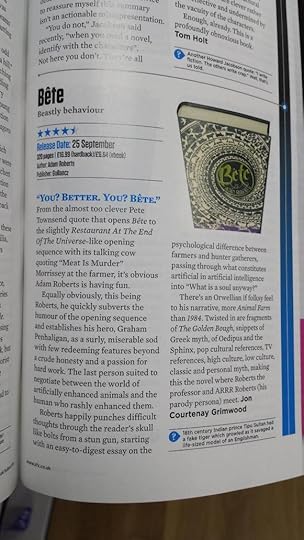
Jon Courtenay Grimwood: four and a half stars. I'm delighted; Jon is one of the most astute critics (quite apart from being one of the best writers) of his generation. Over on twitter he said: "pretty sure I said where Professor Roberts and Adam Roberts meet. Certainly meant it." My cup runneth over.
September 13, 2014
The first review of Bête is in.
It's always a slightly nerve-wracking time, immediately before and immediately after a novel comes out. Reviews are posted. And must be read. Inevitably, every time you read a new review your heart glollops a bit with fear (after all: maybe this one will be the one that utterly cremates your writing and crushes your butterfly-fluttering soul). Luckily for me, this The List notice of Bête (the first review of the book I've seen) is not too negative:
Imagine if your food could talk back to you? That’s the extremely high-concept opener much-decorated sci-fi author and academic Adam Roberts plays with in his latest novel, opening on a bizarre but starkly amusing sequence in which a cow tries to reason with the farmer who’s about to fire a bolt into its head. By page three he’s already quoting The Smiths’ ‘Meat is Murder’ to him, and the farmer’s almost spurred to fire just for that.The conceit in this instance is that many of the world’s animals have been ‘chipped’ in order to allow them to speak as normal humans do. Roberts’ prose is intricate and rich in scientific language and explanation, but it’s also dryly funny and on-the-nose when it wants to be, making this book about so much more than a quirky sci-fi concept. Like the best speculative work it unpeels greater themes, from the morality of AI to humanity’s relationship with its food sources, and also what the very act of possessing language and expression does to our minds.
September 8, 2014
Ten books
This meme was circulating on Facebook, and I succumbed: ten books that have 'stayed with me', or had a particularly shaping influence upon me. I'm copying my answers across to here too. The strange thing was, almost as soon as I posted this list to FB I felt (as I noted in the comments, there) 'more than a little nervous, actually. Posting this feels -- weirdly exposing. Like I've given away the key to my soul. Perhaps I should delete it.' Of course, this unease was a sort of optical illusion. Nobody else cares enough about my choice of books for said choice to leave me, in any way, vulnerable. That was the feeling, though. Odd, no?
So! 10 books that had a properly shaping influence upon me. Since this is about forming me and my taste the list is going to skew adolescent, and accordingly more than a little gauche. Nothing to be ashamed of, that, in and of itself; although it's a bit worrying how male my key texts all used to be. Anyway: here we go.
1. Maurice Sendak, Where the Wild Things Are. One of my holy books.
2. Tintin. I'd tag the whole of Hergé's output if I were allowed (and who's to say I'm not allowed? You? YOU'RE not the boss of me.) But if I'm not allowed, I'd settle for the two moon mission books. I havered between choosing this and choosing the two Lewis Carroll Alice books, which, in some sense, occupy a similar picture/text place in my imagination's storeroom.
3. The Hobbit/The Lord of the Rings. One novel, you know.
4. Tennyson's 1832 Poems -- this began with falling deeply for 'Mariana', mediated through a profound reaction to Millais painting of the same name; but it lead quickly through into all his other early lyrics. The Lotos Eaters! Ah, The Lotos Eaters.
5. Macbeth. [MACBETH? Argh! Hot-potato-orchestra-stalls-Puck-will-make-amends. *tweaks nose*] This was my O-level Shakespeare; the tomorrow-and-tomorrow speech still has the power to lift the tiny hairs at the back of my neck. Not my favourite Shakespeare any more, but the most shaping and influential of his plays on my *coughs* development.
6. Robert Graves The White Goddess.
7. Nabokov, Pnin. "Lolita" is probably a better novel, and Pale Fire certainly a cleverer one, but Pnin is the most moving, as well as the funniest. It also contained some of Nabokov's best prose. It's also short. I read my Dad's old penguin copy. If I weren't allowed Pnin I'd choose "Signs and Symbols", my single favourite ever short story.
8. Orwell, Down and Out in Paris and London. I was a suburban middle-class kid, and material deprivation was a purely notional matter in my life. This book made poverty real to me, imaginatively, and changed the way I saw the world. I could fold Nineteen Eighty-Four in here, too.
9. Dickens. I'm tempted to mention either Little Dorrit or Our Mutual Friend, as they are now my two favourite Dickenses. Dickensseses. But the fact is, it was reading Dombey and Son, and more particularly the chapters detailing little Paul's decline and death, that first took the top of my head off. I remember reading it mouth open at the sheer skill of the writing.
10. Roald Dahl, "A Piece of Cake". This is a tricky one, really: I read Dahl's kid's writing, of course; everyone read it when I was growing up. It was almost compulsory. And there was a TV series made of his adult 'tales of the unexpected' short stories, which was also pretty popular. But this one short story was in a different category: a brief, autobiographical piece about him flying a Gloster Gladiator over the desert, crashing it and waking up in hospital with his burns all bandaged. I remember reading it as an early teenager, for no real reason, just because I chanced upon the paperback. It had the most profound effect upon me. I'm not sure I could diagnose why, or how: it's not a twist-in-the-tale piece, or a sample of his grotesque monstrous inventiveness. Indeed, it's rather oblique. Nor was I particularly interested in world war 2, or the RAF, or flying or anything like that. But the plain fact is: before I read it I had no ambitions to be a writer (I wanted, in point of fact, to make animated cartoons). Then I read it. And after I had read it I wanted to be a writer. Simple as that. Perhaps it had to do with its obliqueness, or its queer reticent potency: it struck me very forceably at a very deep level and I couldn't see how it had done so. At any rate, something vast shifted about inside me as with the motion of great waters, and I wanted to be a writer. Which is, now, what I am.
No science fiction? I know! And I read SF obsessively as a teenager (as I still do). Le Guin would be the eleventh title: The Dispossessed most likely. Though I also loved Earthsea.
September 4, 2014
Finished copies of Bête now in …
I'm extremely excited by this ... you can tell, by the ellipses ... these are the ellipses of an excited author ...
August 29, 2014
News for August, or ‘Who Hath Not Seen Thee Oft Amid Thy Online Store?’
In the parching August wind cornfields bow the head, sheltered in round valley depths on low hills outspread, and I have been moderately busy. I went on holiday, came back, spent time at Loncon, came back from that. Here's a round-up post of news.
1: is that I have finally rolled up the scroll named 'Punkadiddle'. As you'll see at the end of that link, the best of the old blog is now printed up in a book, £3:42 from amazon online store as e-book, so: you know. Buy! Buy! Buy!
2. I have agreed to act as a judge for next year's Kitschies, which (a) means my own novels are guaranteed NO place on the shortlist, hurrah! (or, wait ... boo?) and (b) a Niagara of books has begun flowing through my front door. The good news is that I get to swap aesthetic judgment with the rest of the panel, all of whom are considerably cooler than I: Kate Griffin, Kim Curran, Frances Hardinge and Glen Mehn. The downside is: it's a lot of reading. There's another downside, which I'm thinking of converting into an upside. You know what they say: when life gives you lemons and industrial quantities of sugar -- make lemonade. Often, after I read a book, I'll write (and blog) a quick review, Writing out my thoughts makes those thoughts clear in my head. Writing, I fear, comes more naturally to me than thinking. So I figured: what if I reviewed every title? Last year I believe the K.s had more than 300 submissions, so I'd be committing myself to a peck of work. But I could turn into a project. Like Magnetic Fields writing and releasing 69 Love Songs. I could do 369 Love Songs: SFF Novels Editions. What do you reckon?
If I review 369 titles at, say, 500 words per review (which if I'm honest is the shorter end of my horribly prolix reviewing habit), we'd be looking at 185,000 words. That would make an interesting e-book: The Complete Science Fiction and Fantasy Output of 2014 Reviewed! (I don't doubt there are many more than 369 SFF titles released in any one year; but it would be a broader sample than the usual review collection manages, and might be interesting to do). At any rate I've made a start: check out the August entries over on the SibFric blog. This may putter out, or gather prodigious steam. I'm honestly not sure.
3. At Loncon Ian Whates launched a book with a story by me (and stories by others, more noteworthy than I) in it: mine being 'Baedecker’s Fermi' in Paradox: Stories of the Fermi Paradox ...
He also launched Sibilant Fricative: the Book. As I mentioned above: Buy! Buy! Buy!
4. Another thing I did this summer was write a 'How to Write Science Fiction and Fantasy' book, for the people who used to publish the 'Teach Yourself' franchise, but who have now rebranded them as 'Get Started In'. The proofs for said book came in this week.
5. I also wrote something long-ish for Jared Shurin that may appear as a book-length publication at some later point. I'm quite proud of it actually, but pride is a sin, and I don't want to compound my sinfulness by dilating on the matter here.
July 6, 2014
Sibilant Fricative
Newcon Press are publishing this collection of SF/Fantasy related essays and reviews, with a preface by BSFA Award-winning critic Paul Kincaid, in August (I believe the launch is at Loncon): Newcon supremo Ian Whates facebooked the above photo to show that actual copies are now in existence. Exciting stuff!
I set up the like-named Sibilant Fricative blog in large part to flog, er to 'promote' the book; and so I shall. The blog has accumulated a variety of other things upon it (none of which are in included in the Sibilant Fricative book, confusingly); but don't let that distract you. I intend to flog, er, promote this title within an inch of its life.
June 22, 2014
Bête Bound Proof
June 18, 2014
Cover Reveal: US Edition of Twenty Trillion
I'm not a big fan of the idiom 'cover reveal', actually. It's the 'reveal' part, like I'm a stage performer whisking a white sheet off something as the audience oos and aas. Still that is the idiom, and I'll run with it. So. [takes breath] ... St Martin's Press in New York New York will be putting out Twenty Trillion; and here is the very very lovely cover they have come up with. Isn't it fine?
Adam Roberts's Blog
- Adam Roberts's profile
- 558 followers


